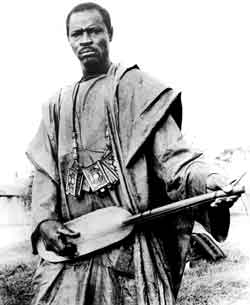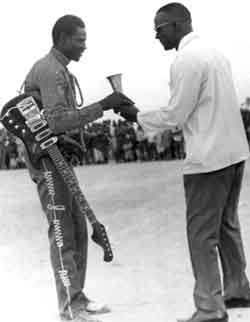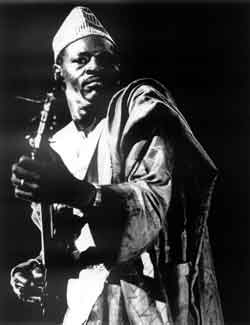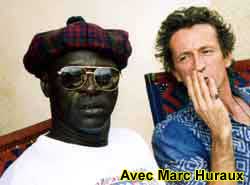|  "l
knew the spirit who gave me the gift very well. And I remember that
night in Niafunke (Toure's home village). A night I'll never forget.
I was about thirteen years old. I was chatting with some friends. l
had a monochord (single string guitar) in my hand. l was wandering playing
ordinary songs, just like that. It was about 2.00 am. l got to a place
where l saw three girls standing like steps of stairs, one higher than
the other. l lifted my right foot. The left one wouldn't move. l stood
like that until 4.00 am. Next day l walked to the edge of the fields.
l didn't have my instrument with me. l saw a snake with a strange mark
on its head. Only one snake. I still remember the colour. Black and
white. No yellow, no other colour, just black and white. And it wrapped
itself around my head. l brushed it off, it fell and went into a hole
and I fled. Since then l started to have attacks." "l
knew the spirit who gave me the gift very well. And I remember that
night in Niafunke (Toure's home village). A night I'll never forget.
I was about thirteen years old. I was chatting with some friends. l
had a monochord (single string guitar) in my hand. l was wandering playing
ordinary songs, just like that. It was about 2.00 am. l got to a place
where l saw three girls standing like steps of stairs, one higher than
the other. l lifted my right foot. The left one wouldn't move. l stood
like that until 4.00 am. Next day l walked to the edge of the fields.
l didn't have my instrument with me. l saw a snake with a strange mark
on its head. Only one snake. I still remember the colour. Black and
white. No yellow, no other colour, just black and white. And it wrapped
itself around my head. l brushed it off, it fell and went into a hole
and I fled. Since then l started to have attacks."
"I
entered a new world. It's different from when you're in a normal state;
you're not the same person you know. You don't feel anything anymore,
whether it's fire, water or if you are beaten. I was sent to the village
of Hombori to be cured and l stayed there for a year. When l felt better,
I returned home to my family. There l began playing again and l was
very well received by the spirits. I have all the spirits. I possess
all the spirits and l work with them. I was born among them and grew
up among them."
 The
Niger is the greatest river that flows through the desert of Mali; a
shimmering piece of silver where life seems to go on unchanged, as it
has done for centuries. When you travel by boat to Niafunke (Ali's home
town in the North West of the country), there's a sense of timelessness.
Long narrow pirogues sail low on the water, heavy with fishing nets,
trading goods and passengers, the boatmen forcing their way in the shallows
between islands of low bush and yellow grasses. On either side, on an
endless scorched horizon of sand, rock, steppe and scrubland, extends
out the Sahel; Hazy blue skies, yellow and red earth, grey mud-brick
villages, black rocks dotted with patches of brilliant green fields
painstakingly irrigated by local farmers. Ali is one of these farmers
and this is what constitutes the colour of his music. The
Niger is the greatest river that flows through the desert of Mali; a
shimmering piece of silver where life seems to go on unchanged, as it
has done for centuries. When you travel by boat to Niafunke (Ali's home
town in the North West of the country), there's a sense of timelessness.
Long narrow pirogues sail low on the water, heavy with fishing nets,
trading goods and passengers, the boatmen forcing their way in the shallows
between islands of low bush and yellow grasses. On either side, on an
endless scorched horizon of sand, rock, steppe and scrubland, extends
out the Sahel; Hazy blue skies, yellow and red earth, grey mud-brick
villages, black rocks dotted with patches of brilliant green fields
painstakingly irrigated by local farmers. Ali is one of these farmers
and this is what constitutes the colour of his music.
The
Niger has its own life. At the height of the dry season it shrinks down
to a snake-like curl between wide sandy banks that measure up to half
a mile-or more. During the rainy season the placid waters flood the
plains, forming lakes that can rage like the ocean. The once silent
river suddenly comes alive with howling winds and torrential storms,
bringing the much needed-rain like a vengeance, covering the banks with
a temporary coat of emerald grass.
To
get to Niafunke, where Ali lives with his family on his farmlands in
the north of Mali, you can either travel by car in the dry season or
for short periods of the year by steamer from Koulikoro (east of Bamako).
During the slow and arduous drive in the sweltering dry heat the scrubland
landscape is intermittently interrupted by the hazy sight of a tiny
village or, on the horizon, a huge herd of cattle. After the rains the
steamer stops at the beautiful river towns of Djenne and Mopti, chugging
along the majestic mud-brick mosques with their wedding-cake like turrets
and creamy surfaces,the flotilla of pirogues painted with red, white,
blue and green abstract designs, the young girls washing clothes on
the banks., the women selling pottery, fruit and vegetables and the
fishermen casting nets... The muezzin's call to prayer drifts downstream.
It's an unhurried journey, time to reflect on the strength, diversity,
and natural rhythm of local culture, in which Ali's music is so firmly
rooted.
Ali
was born in 1939 in the village of Kanau near Gourma Rahous on the banks
of the River Niger in the north west of Mali. He was the tenth son of
his mother but the only one to survive to infancy. "I lost nine brothers
of the same mother and father. The name I was given was Ali Ibrahim,
but it's a custom in Africa to give a child a strange nickname if you
have lost the other children." The nickname they chose for Ali was
'Farka' meaning donkey, an animal admired for its strength and tenacity.
"But let me make one thing clear" he says, "I'm the donkey
that nobody climbs on!"
When
Ali was still a child his father died while serving in the French army,
then the family moved south along the river to their present home Niafunke.
With a population of over twenty thousand people, Niafunke is one of
the larger villages scattered on this sparse, arid semi-desertic region.
The lack of electricity and telephone lines contributes to the tranquil
atmosphere and there is always the cooling breeze from the river. People
make their living by farming, cattle herding and fishing and a great
deal of work is spent irrigating the land. Touré enjoys life there where
he lives a peaceful existence with his wife and eleven children.
 Niafunke
evolves around the trade generated by the quay, which wakes up from
its usual sleepiness whenever the steamer pulls in, springing to frenzied
pitch with the shouts of traders, hawkers and travellers. As the steamer
departs, the monotony of life in a small Sahelian town settles back
in. Music is mostly performed at weddings, christening ceremonies and
circumcision parties, held in the open courtyards and wide sandy streets,
with musicians playing a variety of graceful dance styles, like the
Takamba and Touareg Hekkam. Music is also heard on radio and cassette
and the preference here is still for local music. Mostly, though life
in Niafunke is taken up with the arduous business of farming the land. Niafunke
evolves around the trade generated by the quay, which wakes up from
its usual sleepiness whenever the steamer pulls in, springing to frenzied
pitch with the shouts of traders, hawkers and travellers. As the steamer
departs, the monotony of life in a small Sahelian town settles back
in. Music is mostly performed at weddings, christening ceremonies and
circumcision parties, held in the open courtyards and wide sandy streets,
with musicians playing a variety of graceful dance styles, like the
Takamba and Touareg Hekkam. Music is also heard on radio and cassette
and the preference here is still for local music. Mostly, though life
in Niafunke is taken up with the arduous business of farming the land.
Ali
is Niafunke's most famous citizen. Although internationally known as
a musician he regards himself as a farmer. In Mali, music, although
it is prized above anything else, is mostly the monopoly of castes of
hereditary musicians, whose special role, for centuries has been to
perform the praises and genealogies of noble families and to recite
noble deeds and proverbs. Ali comes from a noble background. There is
no tradition of music in his family. But early in his life, he was attracted
by the force of music. He was born "child of the river".
In
Niafunke, as in most of Mali, the dominant religion is Islam and Ali
is a devout Muslim. But in this part of the world Islam co-exists with
a much older indigenous belief system connected with the mysterious
power of the Niger. People believe that under the water there is a whole
world of spirits called Ghimbala - male and female djinns with their
own character and history and symbolic colours and ritual object; all
this is vividly portrayed in the local mythology .These djinns control
both the spiritual and temporal world. When the harmony of this two
worlds goes wrong , as it inevitably happens in this harsh, unpredictable
climate, when there are unexplained illnesses or sudden natural disasters,
then people get together to hold spirit ceremonies, in which music and
dance are the central activity. Then thanks to music, spirits may accept
the gifts, and if so, it is considered as an auspicious sign. Those
who have the ability to communicate with the spirits are called "children
of the river."
 Ali
had no formal schooling and his childhood was marked by farming. But
he was also mesmerised by the music played at spirit ceremonies in the
villages along the banks of the Niger. He would sit and listen with
amazement as musicians sang and played the favoured instruments of the
spirits: jurukele (single string guitar), n'jarka (single string violin)
and n'goni (four string lute). His family did not regard music as a
worthy occupation and the boy's interest was not encouraged. He was
however a fiercely independent and self-determined young boy and at
the age of twelve he fashioned his first instrument, a "jurukele"
(single string guitar that he presented as a gift to Ry Cooder many
years later). Ali
had no formal schooling and his childhood was marked by farming. But
he was also mesmerised by the music played at spirit ceremonies in the
villages along the banks of the Niger. He would sit and listen with
amazement as musicians sang and played the favoured instruments of the
spirits: jurukele (single string guitar), n'jarka (single string violin)
and n'goni (four string lute). His family did not regard music as a
worthy occupation and the boy's interest was not encouraged. He was
however a fiercely independent and self-determined young boy and at
the age of twelve he fashioned his first instrument, a "jurukele"
(single string guitar that he presented as a gift to Ry Cooder many
years later).
Ali
learned very easily and naturally to play guitar even if he suffered
of illness caused by his contact with the spirit world. He was sent
away to be cured and when he returned he quickly became recognised for
his power to communicate with the spirits. Ali was greatly influenced
by his grandmother Kounandi Samba who was famous in the area as a priestess
of the Ghimbala. But after her death, he was dissuaded to take over
her. "Because of Islam, l don't want to practice this type of thing
too much...these spirits can be good to you or bad, so l just sing about
them, but its our culture, we can't pass it by ." Many of his songs
are about the spirits and he always travels with his n'jarka violin
as well as recordings of spirit music which he listens to whenever it's
possible.
As a teenager Ali worked as a taxi driver and car mechanic and he also
spent some time as a river ambulance pilot. He travelled widely in these
jobs and continued to play music in ceremonies and for his pleasure,
with small groups and accompanied some singers. By his early twenties
he was able to speak seven Malian languages fluently and had mastered
the n'goni (traditional four string lute), n'jarka violin and Fulani
bamboo flute. He learned a vast repertoire of music and legend from
the various masters he encountered on his travels. "I had to use
the experience of the heroes of music, both of those who are still alive
or those who are dead, to become a good musician. This experience gave
me the opportunity to know the culture of this music, its biography,
legend and history."
 Ali
is Sonrhaï, ethnic group which form the majority of the population of
Niafunke, but there are also many other languages spoken in the region:
Peuhl (the language of the Fulani nomadic pastoralists), Bozo, Bambara,
Dogon, Zarma and Tamascheq (the language of the Touareg). Touré sings
in all these languages but the majority of his repertoire is in Sonrhaï
and Peuhl. Ali
is Sonrhaï, ethnic group which form the majority of the population of
Niafunke, but there are also many other languages spoken in the region:
Peuhl (the language of the Fulani nomadic pastoralists), Bozo, Bambara,
Dogon, Zarma and Tamascheq (the language of the Touareg). Touré sings
in all these languages but the majority of his repertoire is in Sonrhaï
and Peuhl.
In
1956, during his travels, Ali saw a performance of the National Ballet
of Guinea featuring the great Malinke guitarist Fodeba Keita. "That's
when l swore l would become a guitarist. l didn't know his guitar but
l liked it a lot. l felt l could do the same and that I could prove
it." He began to borrow guitars to practice and found that it was
very easy to transpose his traditional guitar technique to the Western
instrument. At about the same time he added percussion, drums and accordion
to his musical skills (even making a few appearances performing Charles
Aznavour repertoire!).
Upon
Mali gaining independence from the French in 1960 the new government
under President Modibo Keita initiated a policy to promote the arts
and cultural troupes were formed to represent each of Mali's six administrative
regions. From 1962 Ali worked with the Niafunke district troupe. He
composed songs, played guitar and rehearsed singers and dancers in a
troupe numbering a hundred and seventeen people. He was extremely proud
of the troupe which was successful in the biannual competitions held
in Mopti throughout the 1960's. Ali also won numerous athletic prizes.
"I did my best to see adoptive village awarded. I'm very found of
my village!"
 In
1968 (the year Modibo Keita was overthrown by Moussa Traoré),Ali made
his first trip outside Africa because he was selected (along with guitarists
Kelitigui Diabate and Djelimadi Tounkara) to represent Mali at an international
festival of the arts in Sofia, Bulgaria. They performed arrangements
of traditional music with Ali on guitar, flute, djerkel and njarka.
It was in Sofia on April 21st ,1968 that he bought his first guitar. In
1968 (the year Modibo Keita was overthrown by Moussa Traoré),Ali made
his first trip outside Africa because he was selected (along with guitarists
Kelitigui Diabate and Djelimadi Tounkara) to represent Mali at an international
festival of the arts in Sofia, Bulgaria. They performed arrangements
of traditional music with Ali on guitar, flute, djerkel and njarka.
It was in Sofia on April 21st ,1968 that he bought his first guitar.
In
1970, Ali's work took him from Niafunke to Mopti and later to the capital,
Bamako. Here he began a decade working for National Radio Mali as an
engineer. He also played as part of Radio Mali's Orchestra until it
was dislocated in 1973. In the 1960's Toure became well-known as a great
traditional musician through his broadcasts on Radio Mali playing flute
and n'goni. Throughout the 1970's he brought his unique guitar style
to the attention of the country in further broadcasts. In the advice
of a friend who is journalist, he sent a number of recordings of these
broadcasts to the SonAfric record company in Paris. A few months later,
the first album of Ali Farka Touré (amongst the very first commercial
records of Malian music) was released. The four songs of that album
are included in this collection. He continued to record in Bamako and
send the tapes to Paris and a total of seven albums were released. The
first five of them are now extremely rare.
The
1970's was a period of intense musical activity in Mali. It's at this
period that a rich mixture of musical styles arrived for the first time
in Bamako. First, there was the wealth of Mali's own diverse musical
traditions; and hen, there were foreign styles that were making an impact
on local dance orchestras.
The major influences on Mali at the time were dance music from Cuba,
rumba from Zaire, the guitar styles from neighbouring Guinea and the
music of African American singers like James Brown, Otis Redding and
Aretha Franklin. Ali is still a great fan of all these - partly as he
says because he hears so much of his own music in them.
Of
all these music's the one which struck him as most similar to his own
was the blues. In 1968 a friend who was studying in Bamako played him
records of James Brown, Jimmy Smith, Albert King and John Lee Hooker.
He was immediately struck by the thought that "this music has been taken
from here". ln Hooker's music especially he heard echoes of Tamascheq
music. Recordings of Otis Redding and John Lee Hooker are still very
popular in Niafunke. Although Touré was very impressed by Hooker's music
he says he was not influenced by it. More, it served to confirm to him
the value and international aspects of his own traditions.
 Throughout
the 1970's, Ali established himself a formidable reputation in Mali
as a solo artist. He pioneered the adaptation of Sonrhaï, Peuhl and
Tamascheq styles to the guitar. Even today, few have followed his path.
His charismatic person, his fine voice and intricate flowing guitar
technique, his good looks and enigmatic character, have all contributed
to give him prestige. He remains uncompromisingly wedded to his traditional
music, refusing to "go commercial". His songs celebrate love,
friendship, peace, the land, the spirits, the river and Mali; all expressed
in dense metaphors. Throughout
the 1970's, Ali established himself a formidable reputation in Mali
as a solo artist. He pioneered the adaptation of Sonrhaï, Peuhl and
Tamascheq styles to the guitar. Even today, few have followed his path.
His charismatic person, his fine voice and intricate flowing guitar
technique, his good looks and enigmatic character, have all contributed
to give him prestige. He remains uncompromisingly wedded to his traditional
music, refusing to "go commercial". His songs celebrate love,
friendship, peace, the land, the spirits, the river and Mali; all expressed
in dense metaphors.
ln
1987 for the first time since the Festival of Sofia in 1968, Touré travelled
alone outside of Mali to play his first concert. Showing no signs of
nerves or unfamiliarity with his surroundings and with absolute and
supreme confidence in his music he played a masterful series of shows
winning audiences everywhere. In the same year his first recording with
the small independent U .K. label World Circuit was an instant success.
Since then he has undertaken extensive tours of Europe, U.S.A. Canada
and Japan and has recorded four more albums for the label. His recent
recordings have been made with more advanced recording technology and
he has collaborated with international artists such as Ry Cooder and
Taj Mahal. But his early recordings, "when I was absolutly crazy
of guitar", says Toure, have a power and ambiance of their own.
Sleeve Notes by Lucy Duran. |